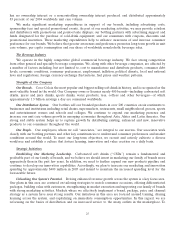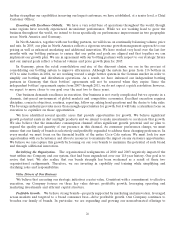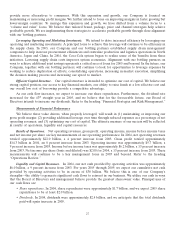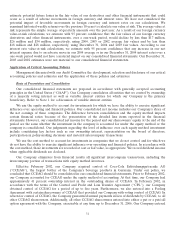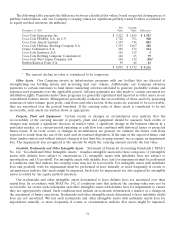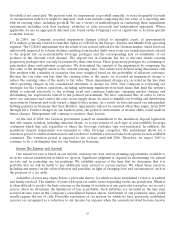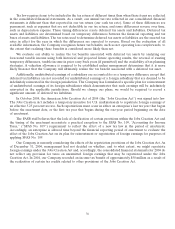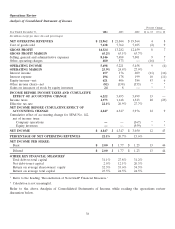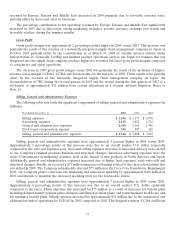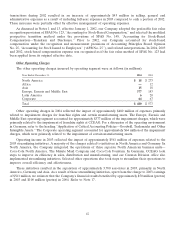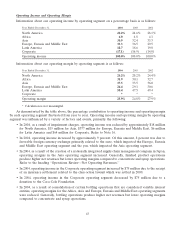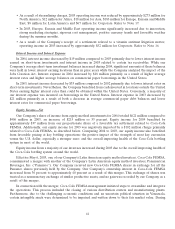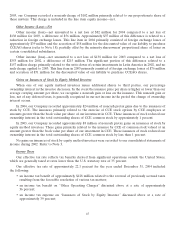Coca Cola 2004 Annual Report Download - page 37
Download and view the complete annual report
Please find page 37 of the 2004 Coca Cola annual report below. You can navigate through the pages in the report by either clicking on the pages listed below, or by using the keyword search tool below to find specific information within the annual report.
Goodwill is not amortized. We perform tests for impairment of goodwill annually, or more frequently if events
or circumstances indicate it might be impaired. Such tests include comparing the fair value of a reporting unit
with its carrying value, including goodwill. We use a variety of methodologies in conducting these impairment
assessments including cash flow analyses, estimates of sales proceeds and independent appraisals. Where
applicable, we use an appropriate discount rate, based on the Company’s cost of capital rate or location-specific
economic factors.
In 2004, our Company recorded impairment charges related to intangible assets of approximately
$374 million, primarily related to franchise rights at CCEAG in the Europe, Eurasia and Middle East operating
segment. The CCEAG impairment was the result of our revised outlook for the German market, which has been
unfavorably impacted by volume declines resulting from market shifts away from our branded products related
to the deposit law on nonreturnable beverage packages and the corresponding lack of availability of our
products in the discount retail channel. The deposit law in Germany has led to discount chains creating
proprietary packages that can only be returned to their own stores. These proprietary packages are continuing to
gain market share and customer acceptance. We determined the amount of the impairment by comparing the
fair value of the intangible assets to the current carrying value. Fair values were derived using discounted cash
flow analyses with a number of scenarios that were weighted based on the probability of different outcomes.
Because the fair value was less than the carrying value of the assets, we recorded an impairment charge to
reduce the carrying value of the assets to fair value. These impairment charges are recorded in the line item
other operating charges in our consolidated statement of income for 2004. Our Company is evaluating our
strategies for the German operations, including addressing significant structural issues that limit the system’s
ability to respond effectively to the evolving retail and consumer landscape, assessing market changes and
determining our expectations related to the political environment. We have concluded that, in order to better
serve our customers and control the costs in our supply chain, we need to simplify our bottling and distribution
operations in Germany and work toward a single bottler system. As a result, we have informed our independent
bottling partners in Germany that their Bottlers’ Agreements will not be renewed when they expire, from 2007
through 2011. Further changes in our business plan, the political environment or market shifts could result in
future charges. Management will continue to monitor these factors.
At the end of 2004, the German government passed an amendment to the mandatory deposit legislation
that will require retailers, including discount chains, to accept returns of each type of non-refillable beverage
containers which they sell, regardless of where the beverage container type was purchased. In addition, the
mandatory deposit requirement was expanded to other beverage categories. The amendment allows for a
transition period to enable manufacturers and retailers to establish a national take-back system for non-refillable
containers. The transition period is expected to last at least until mid-2006. Therefore, we expect 2005 to
continue to be a challenging time for our business in Germany.
Income Tax Expense and Accruals
Our annual tax rate is based on our income, statutory tax rates and tax planning opportunities available to
us in the various jurisdictions in which we operate. Significant judgment is required in determining our annual
tax rate and in evaluating our tax positions. We establish reserves at the time that we determine that it is
probable that we will be liable to pay additional taxes related to certain matters. We adjust these reserves,
including any impact on the related interest and penalties, in light of changing facts and circumstances, such as
the progress of a tax audit.
A number of years may elapse before a particular matter, for which we have established a reserve, is audited
and finally resolved. The number of years with open tax audits varies depending on the tax jurisdiction. While it
is often difficult to predict the final outcome or the timing of resolution of any particular tax matter, we record a
reserve when we determine the likelihood of loss is probable. Such liabilities are recorded in the line item
accrued income taxes in the Company’s consolidated balance sheets. Settlement of any particular issue would
usually require the use of cash. Favorable resolutions of tax matters for which we have previously established
reserves are recognized as a reduction to our income tax expense when the amounts involved become known.
35


